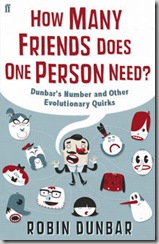Published: March 14, 2010
Renowned evolutionary anthropologist Professor Robin Dunbar visits the RSA to explain how the very distant past underpins all of our current behaviours, and how we can best utilise that knowledge .
 The director of the Institute of Cognitive and Evolutionary Anthropology at Oxford University is also the author of How Many Friends Does One Person Need? (Faber)
The director of the Institute of Cognitive and Evolutionary Anthropology at Oxford University is also the author of How Many Friends Does One Person Need? (Faber)
Published: March 13, 2010
The pitfalls of life with a difficult mother The Independent
I to could write a book on this subject. Its 5 years since my mother passed away and only now am I beginning to understanding the complexity of my relationship with her and the coping mechanisms that I developed to negotiate and maintain our relationship. And how it came at great personal cost.
Oh that I could, with my hand on heart, profess not to be “mummy dearest” to my own 4 kids. Fortunately though I have my partner Dr. O, who is on me like a “ton of bricks” whenever I stray too far down that path! This great article in the Independent is written by psychologist Dr. Terri Apter whose books on family dynamics, identity and relationships have received international acclaim link to read
Published: March 12, 2010
 A new randomized trial shows that on average, three months after receiving a series of 10 massage sessions, patients had half the symptoms of anxiety. This improvement resembles that previously reported with psychotherapy, medications, or both. But the trial, published in the journal Depression and Anxiety, also found massage to be no more effective than simple relaxation in a room alone with soft, soothing music. [continue reading…]
A new randomized trial shows that on average, three months after receiving a series of 10 massage sessions, patients had half the symptoms of anxiety. This improvement resembles that previously reported with psychotherapy, medications, or both. But the trial, published in the journal Depression and Anxiety, also found massage to be no more effective than simple relaxation in a room alone with soft, soothing music. [continue reading…]
Published: March 11, 2010

Divining the Right Drug , Scientific American reports on a new device that may take the guesswork out of prescribing an antidepressant that works.
Imagine suffering from the crushing weight of major depression, then finally getting diagnosed and starting treatment with a drug—only to realize after two months that the medication, despite its unpleasant side effects, is not alleviating your depression. Unfortunately, this experience is far from rare: more than two thirds of patients with depression have no luck with the first medication they are prescribed and must also endure the withdrawal effects that come with discontinuing a drug before trying a new one. Finding the right treatment can prove a lengthy, painful process of trial and error. A new technology, however, may bypass this ordeal by gauging very early in a treatment regimen how well a drug is working based on the patient’s brain waves. continue reading
Source: Scientific American
 The director of the Institute of Cognitive and Evolutionary Anthropology at Oxford University is also the author of How Many Friends Does One Person Need? (Faber)
The director of the Institute of Cognitive and Evolutionary Anthropology at Oxford University is also the author of How Many Friends Does One Person Need? (Faber)


